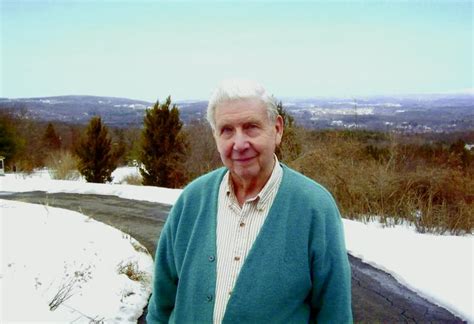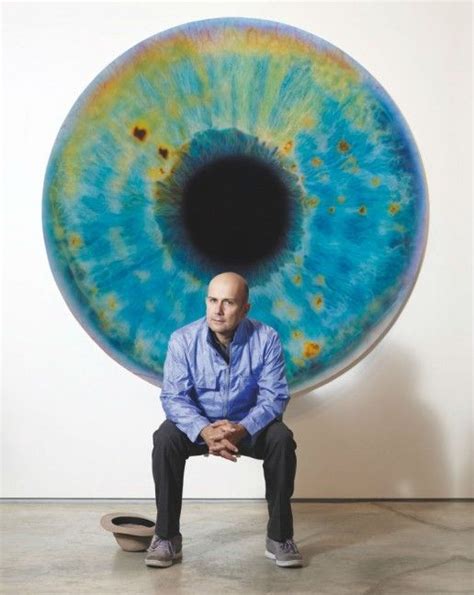A Quote by Marilynne Robinson
I really don't know why people have so much trouble now writing about religious faith. It is true that clichés can override more interesting impulses. But the desire to find meaning, to be generous, to live well in an ethical and spiritual sense, is so widespread that it should not seem alien to people when it is expressed in the terms of traditional religion.
Related Quotes
I resist all established beliefs. My religion basically is to be immediate, to live in the now. It's an old cliche, I know, but it's mine. I envy people of faith. I'm incapable of believing in anything supernatural. So far, at least. Not that I wouldn't like to. I mean, I want to believe. I do pray. I pray to something ... up there. I have a God sense. It's not religious so much as superstitious. It's part of being human, I guess ... Do unto others: How much deeper into religion do we really need to go?
We need to build millions of little moments of caring on an individual level. Indeed, as talk of a politics of meaning becomes more widespread, many people will feel it easier to publicly acknowledge their own spiritual and ethical aspirations and will allow themselves to give more space to their highest vision in their personal interactions with others. A politics of meaning is as much about these millions of small acts as it is about any larger change. The two necessarily go hand in hand.
Religion is organized, and spirituality is what the individual feels in his relationship with truth and with God. And although spirituality may be expressed in a religion, many people are spiritual and never go to church. They aren't religious in the sense that they practice a certain type of discipline.
Religion would certainly be more relevant to the hurting masses of humanity if people could express their hopes and dreams and pain and anguish to one another in the context of religious worship. As it is now our services are so antiseptic and sterile that people gathering for worship relate to others at only the most superficial level, and hardly ever get to know one another. . . . Maybe that is one of the reasons why people feel religion is irrelevant, because they cannot find support and solace during times of crisis and pain. That is when real religion should be at its best.
Tibet, why is it occupied? For political reasons maybe they have a reason. I don't know. But religiously, why? The fact that the religious community is being oppressed and persecuted is something that every single person in the world who has any religious faith and religious feeling for - for people who have faith should speak up.
There's a limit of any form of representation; it's the same about writing about visual art. I still think it's useful for people to think through things in a deeper way, and use adjectives even if they're not sufficient, you know? I always find it interesting what terms they use to refer to the work. It's always different, and that's kind of intriguing. Sometimes it's clichés, but often it's really creative ways of paraphrasing or reformatting what to mean seems something else. I like that, personally.
There are very few good writers about art, and you either get art-fashion writing with trendy views or you get very traditional writing. Occasionally, you get people who can write in an interesting way. Really, I think in a sense art writing needs to be renewed as well. It's in a pretty bad condition.
One odd thing about the current debate between religious people and atheists is that the participants don't seem to care that they entirely fail to communicate with the other side. They therefore have no account of why the religious or the atheists believe what they do, except that they are stupid or deluded. I think philosophers should try and make sense of their disputes with their opponents as far as possible without treating them as idiots. This applies to the religious participants in the debate as much as to the atheists.
Right now, culturally, we're seeing a really interesting evolution in ideas about spirituality and the world, right? The number of people who consider themselves to be religious and going to services is dropping, and the number of people who consider themselves to be spiritual but not religious is increasing.
I spoke to my father - my father's from Pakistan and he's also a lawyer - I said to him, "Well what does the Shari'a say?" And he said, "Well, of course it doesn't justify suicide bombs," but he didn't seem to know where the Shari'a came from or what it was all about. The more I asked people in my family as well as friends, the more I realized that there seemed to be widespread ignorance in the Muslim community. And that's something which I actually found to be the case over the next two and a half, three years I spent writing the book.
The religion of the future will be a cosmic religion. It should transcend a personal God and avoid dogmas and theology. Covering both the natural and the spiritual, it should be based on a religious sense arising from the experience of all things, natural and spiritual, as a meaningful unity. Buddhism answers this description.
I wonder why anyone would hesitate to be generous with their writing. I mean, if you really want to make a living, go to Wall Street and trade oil futures ... We're writers. We're doing something that is inherently a generous act. We're exposing ourselves to the muse and to the things that frighten us. Why do that if you're not willing to be generous? And paradoxically, almost ironically, it turns out that the more generous you are, the more money you make. But that's secondary. For me, the privilege of being generous is why I get to do this.
I write about people I think are interesting, and then I discuss it with my editor, and she decides if she thinks it will be interesting to children as well. If I have no great interest in the subject, I find the work to be terribly boring. And if I find the person interesting, I love the research part and, by extension, the writing as well.
I am a nonbeliever myself. But I think there's so much about religion that is not factual in nature as to why people engage with it and what it means to them. You can debunk why you think there's no physical evidence for God and why the story of Jesus didn't really happen that way and stuff like that all the live-long day, and it's not going to make a difference to what role religion has in people's lives and how they feel about it and how it makes their lives better or worse.
It's when people begin using their religion as just a way of getting power over other people that scares me. I'm afraid that's what's going on in a lot of cases right now. When people deliberately tell lies, Creationism for instance, and pretend, "Oh, it's not really religion." I mean they know they're lying, and yet they're the religious people. There's something wrong there.







































